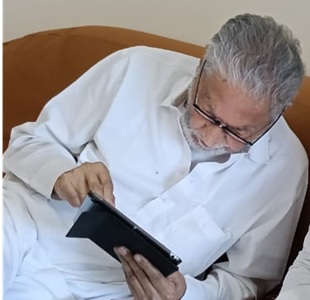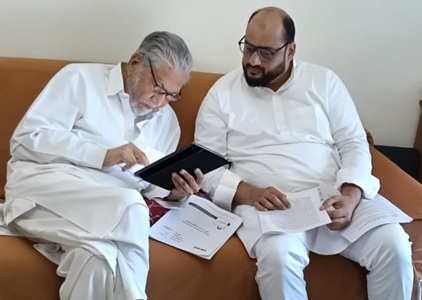By: – Syed Zahid Ahmad
After Bihar election Modi needs to review his development strategy because failure of development agenda in converting pooled crowds into voters indicates that people are not satisfied with his development strategy. Easing up regulations to attract Foreign Direct Investments (FDI) may increase liquidity in domestic market, but it is also important to ensure that the fruits of development should be proportionately shared among all sectors of the economy. Increased foreign investments and improved brand India may help corporate to expand their businesses abroad or to collaborate with foreigners for investing in India; but Indian workers engaged in the unorganized sector yet to taste the fruits yielded through Modi’s development initiatives. People can’t keep voting for slogans and promises only.
Though schemes like JandhanYojna, Digital India, Make in India and skill India etc. potentially aim to benefit the poor Indians; and by allotting Udhyog Adhar to MSMEs and labour Identification Number (LIN) to workers, Modi Government is trying to protect the development grounds from corruptions; but majority of Indian workers engaged in the unorganized sector establishments yet not find these schemes supportive for their livelihood. These schemes may support India’s development in future, but poor people look for immediate economic and financial supports.
With decline in income and employment growth along with rise in food inflation are adding challenges for poor people to survive. The attractive offers in election manifestos by political parties actually lead to increase in tax rates and debt burdens. The burden of fiscal deficit is often passes on to the tax payers and consumers; and increase in public debts reduces public revenues for welfare programs. Government cannot ensure welfare economy with increased fiscal deficit. So, we need to consolidate fiscal deficit for welfare of people. Measures to control fiscal deficit should not hamper growth nor add burden upon taxpayers and consumers. Government should try drawing maximum investments for infrastructural development by mode of equity and lease finance offering the investors to earn profit orrental income through viable projects. Such mode of finance may help the Government reduce burden of interest based debts. Reduced debt burden would ultimately increase public revenues for welfare programs.
Government should also initiate for reforming the exorbitant tax structure otherwise entrepreneurs would keep hiding their real transactions; ultimately adding on black money in India. Introducing transaction tax instead of GST was a better proposal to improve India’s tax structure. India needs to ensure that maximum establishments should be in a position to submit annual accounts and returns along with taxes.
According to Sixth Economic Census 93.5% establishments fall under unorganized sector and just 6.5% are registered as Micro Small and Medium Enterprises (MSMEs) under Udhyog Adhar and not even 1.5% establishments are registered with Ministry of Corporate Affairs. We should target that at least 15% establishments should be converted into corporate. If Modi wants to make Sabka Saath Sabka Vikaas a successful campaign, he needs to propose development plans for 120 million workers engaged into 54 million unorganized sector establishments by facilitating them to improve their livelihood. Hardly any Chamber of Commerce or institution raises problems faced by unorganized sector enterprises wherein 94% Indian workers are engaged. So, Modi needs to self initiate suitable process for reaching out to these workers.
Statistics suggests that the share of banking and insurance has increased from 5.8% of India’s GDP in 2004-05 to 9.4% in 2012-13. Similarly the share of Communication industry has increased from 1.7% in 2004-05 to 4.1 in 2012-13 and share of Agriculture reduced from 16.0% in 2004-05 to 11.8% in 2012-13. In during this period, the trade activity maintained steady grows with its share of 14.6% in GDP during 2004-05 to 2012-13.
According to two different reports published in 2015 by Goldar Sub Committee (on Unorganised Manufacturing & Services Sectors and Private Corporate Sector including PPPs) the Retail trade (except of motor vehicles) is second most productive activity after manufacturing. These two reports states that during 2011-12 Manufacturing activity generated highest Gross Value Addition (GVA) worth Rs. 12,60,882 crores; whereas Retail trade (except of motor vehicles and motor cycles) with GVA of Rs. 5,71,897 is second most important activity. Computer and related services with GVA worth Rs. 2,50,550 is third important activity in Indian economy.
Before liberalizing FDI in wholesale and retail business, there is need to frame strategic plan to protect domestic trade establishments from increased competition with entry of more multinational companies in wholesale or retail business. Considerably 98% GVA by retail trade (except Motors) and 58% GVA through wholesale trade is generated by the unorganized sector establishments. The share of organized trade in India is also increasing from 4% in 2006 to 8% by 2012, mainly due to entry of new foreign players in organized trade. The Government should plan to register maximum enterprises dealing in trade activities. After DIN, LIN and Udhyog Adhar, it’s time the Government should start issuing Vyapar Adhar to identify and register maximum number of traders.
To avail required financial support for growth, the unorganized sector enterprises largely depend upon loans from Micro Finance Institutions (MFIs) or private money lenders. The interest rate charged over these loans is almost two to three times higher compared to interest charged by banks. With no provision for equity finance, these enterprises feel better to not register anywhere (probably with intention to avoid hassle of filing returns and escaping from exorbitant tax system) in absence of any financial support / incentives in return from Government side. Majority of registered traders complain about keep paying taxes without any incentive / rewards in returns from the Government. Government should floats schemes with intention to induce registration of more and more traders in India. There are incentive based schemes for manufacturing, Khadi and handicrafts units but we don’t find such kind of scheme for traders in India.
India needs to launch micro equity fund for unorganized sector enterprises so that they willing come forward to register themselves under relevant act to qualify for availing equity fund. Required institutional, accounting, managerial and market support may be provided by MFIs supposed to provide micro equities. Improved infrastructure, accounting and management system in these enterprises will enable them collaborate or compete with upcoming multinational companies. Without micro equity unorganized sector enterprises would always find difficult to improve themselves; and in coming years they may face tougher challenges from organized retail companies and IT based trade enterprises.
Statistics may further reveal that fast growing share of companies like Amazon, Snapdeal, Shopclues, Ebay, Flipkart etc. and telemarketing companies like Homeshop18, Naaptaul, and ShopCJ etc. are going to pose serious threats for petty traders in the unorganized sector. Certainly there are advantages of FDI in organized trade which helps farmers and producers at one hand and customers on the other hand. Restricting FDI is not advisable, but opening gateway without protecting micro enterprises may create serious threats for 15% Indian workers engaged in trade activities. There should be protective wall for petty traders before liberalizing FDI in wholesale and retail business in India.
To convert the unorganized enterprise into organized enterprises, we need to register them under relevant acts, and help them improve their infrastructure, labour, accounting, managements system and sales. Supply of Micro Equity to unorganized sector enterprises may induce them for proper registration and compliance with relevant acts and rules. Equity support may also encourage such enterprises improve to a level where they can collaborate or otherwise compete with organized traders. Such collaboration will improve wholesale and retail business in India along with protecting domestic petty traders.
To promote equity finance for MSMEs, the government proposed a Rs. 10,000 crore fund in the Union Budget 2014 along with announcing a Committee to examine the financial architecture of the MSME sector. Accordingly Kamath Committee was set in September 2014. This committee submitted its report in February 2015 with specific chapter on equity financing for MSMEs. But the committee did not suggest means and methods to empower unorganized sector MSMEs so that they can attain required qualification for availing equity funds.
Government should also note that business of private equity is on rise in India. There is need to frame required regulations to ensure that such private equity investors and intermediaries pay due attention to improve unorganized sector enterprises in India. Government should also frame a committee asking for suggestions about means and methods to convert unorganized enterprises into organized units. This committee may need professionals with experience in serving micro enterprises through triad methodology of proving finance along with institutional support and market support to improve their business.
Hope the Modi Government would review its development strategy to ensure that fruits of development should be shraed proportionately among unorganized sector enterprises, MSMEs and corporate otherwise Modi may not justify the campaign of Sabka Saath Sabka Vikas. Who else can envisage the challenges faced by unorganized sector workers better than a Prime Minister who hold experience to work for tea stall? Now he need to justly work for the nation, states, the corporate, MSMEs and all the poor workers engaged in the unorganized sector enterprises. Is he ready to review his development strategy whether he is doing justice to all?
Zahid can be contacted on economicinitiatives@gmail.com







0 Comments